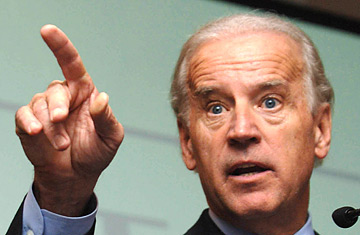
Delaware Senator Joseph Biden.
Spin constitutes most of what's said in politics and other areas of public life (like Hollywood), and if it's not spin, it's a gaffe. Journalists enjoy gaffes as a slight taste of human reality at the banquet of artifice where they sup. They also enjoy the power of the gaffe to generate stories. Like stone soup, a gaffe can provide days of nourishment from almost nothing. A gaffe offers more stages of grief than Elisabeth Kbler-Ross: denial, quibbling, refusal to apologize, qualified apology, slavish apology, and so on.
But a small secret is that journalists don't mind spin either. A politician's ability to spin is a measure of his or her professionalism, which journalists respect. Furthermore, spin needs to be interpreted, which is the journalist's job. If politicians were totally truthful, political journalists would be out of business.
It has been a magnificent season for gaffes. Consider just the past couple of weeks, Barbara Boxer ostensibly dissed Secretary of State Condoleezza Rice for not having an " immediate family." A hapless Pentagon official named Charles Stimson called on American corporations to fire any law firm that represented terror suspects. An actor on Grey's Anatomy used the word "faggot" at the Golden Globe awards in the course of denying that he had used this word about another member of the cast last October. French president Jacques Chirac said that it wouldn't be so bad if Iran got a nuclear bomb "or perhaps a second bomb a little later."
And then came Joe Biden. On Wednesday, announcing his run for President, he praised his Senate colleague and presidential rival Barack Obama as "articulate and bright and clean and a nice-looking guy," and declared that this was a first for African American presidential candidates. The Rev. Al Sharpton, who ran for president in 2004, informed Biden, who called to apologize, that he takes a bath every day. Sharpton is good at moments like this. He manages to declare himself available for compensatory pandering, without pretending that he doesn't get the joke. But generally, the first thing that happens when someone commits a boner like this is that everybody else — political rivals, journalists, news junkies, even his or her own staff — has a good laugh. Then everybody declares how saddened they are or how angry they are, and demands an apology. Or, more commonly, an escalating series of apologies.
An apology is almost inevitable. On the current list, only Boxer — whose alleged gaffe was truly a frame-up — has avoided one. And the first attempt is usually inadequate. They apologize "if" anyone took offense at their remarks, which were "misinterpreted." Stimson of the Pentagon took the false impression route: he is so sorry that some people might have inexplicably gotten the impression that he meant what he obviously did mean when he said what he said (it clearly wasn't the best strategy; late Friday the Pentagon announced that Stimson had resigned because ""the controversy surrounding him...was hampering his ability to be effective in his current position"). The Grey's Anatomy actor, Isaiah Washington, chose the therapeutic option. He can't "defend nor explain" what he said, "there are issues I obviously need to examine within my own soul," he knows that "a mere apology" won't "end this," and so on and on. "Can I stop now?" you can almost hear him pleading to ABC, his employer. "No!" they reply with a crack of the whip. "More groveling! Get sorrier!" Big companies functioning as gaffe cops is one of the disturbing aspects of these rituals.
The Outraged Reaction Machine chews up gaffers and spits them out without making many distinctions. But we can make a few. Should it destroy your career to use the word "faggot" in the course of denying that you had used it before? Even if the denial is dishonest, it seems more like an apology than a repeat of the original crime. And is it really a gaffe if the alleged victim feels no pain? Condi Rice only complained about Boxer's passing remark after the likes of Bill O'Reilly and Rush Limbaugh had made an issue of it. And neither she nor any of the Fox News feminists took offense, or even note, when Laura Bush said in December, in People magazine, that Rice wouldn't run for President, "probably because she is single."
A real gaffe ought to reinforce some pre-existing suspicion: the Bush folks don't care about civil liberties, or Chirac is losing his marbles. One TV commentator, trying to explain his ginned-up outrage over Boxer, accused her of thinking that a black woman can't be Secretary of State without children — a form of prejudice so convoluted that no one could actually have it, let alone a liberal congresswoman from northern California.
And what about Biden? He's apologizing like crazy, but his presidential bid is dead. Is this fair? No, it isn't. You can believe, if you want, that his legendarily overactive tongue released something toxic deep inside his middle-aged white male head. And maybe you are confident that nothing similar could possibly spill out of yours. Or you can decide that no man is responsible for his subconscious, and judge him by his spin, not by his gaffes.
